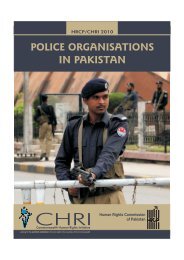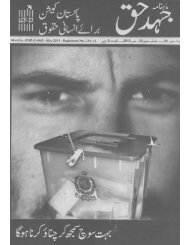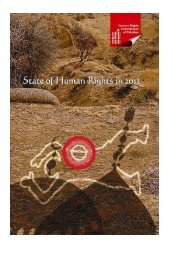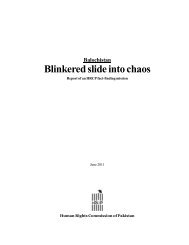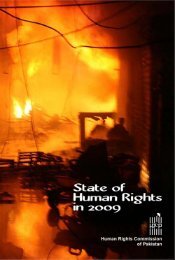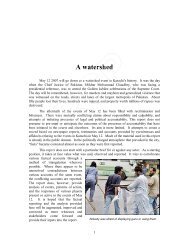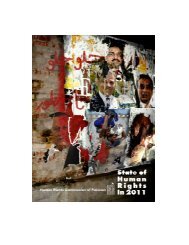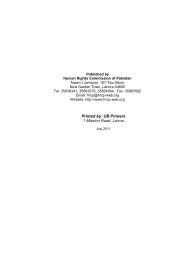Download PDF file - Human Rights Commission of Pakistan
Download PDF file - Human Rights Commission of Pakistan
Download PDF file - Human Rights Commission of Pakistan
- No tags were found...
Create successful ePaper yourself
Turn your PDF publications into a flip-book with our unique Google optimized e-Paper software.
Annexures 131creation <strong>of</strong> the Police Order (Amendment) Ordinance, 2004 by the government. The Ordinance amends or replaces73 <strong>of</strong> 187 articles in the police order and it does not address some <strong>of</strong> the areas where amendment, in his opinion, wasrequired. Hence, by undermining the spirit <strong>of</strong> the Order there is an exacerbated resistance to it by the majority <strong>of</strong>police <strong>of</strong>ficials. The main amendments undermined the spirit <strong>of</strong> the Order, in particular those aspects that had wishedto imbibe elements <strong>of</strong> autonomy, external accountability, and an effective DPO-District Nazim relationship in to thepolice system. Examples include: The composition <strong>of</strong> the PSCs has been altered to include MNAs and MPAs in a partial tilt towardsmembers <strong>of</strong> the ruling party. Previously, the composition was half zila council and half independent. Now a thirdcomponent <strong>of</strong> elected <strong>of</strong>ficials has been added.Introduction <strong>of</strong> a non-binding element in PSC recommendations.Merger <strong>of</strong> complaints bodies and PSCs, which were to remain separate under the original Order.The amendments have caused confusion and a serious loss <strong>of</strong> efficiency and are seen as an attempt to havepower that was given to PSCs brought back to the provincial government level, especially with regards to transfersand postings. The real issue is that under the amendments there has been a paradigm shift where authority hasshifted away from the people to the government.According to Mr. Dogar the way forward is to:Revert to the original police orderAmend it to remove irritantsDiscussion <strong>of</strong> Consultation:Create a change management mechanism<strong>Pakistan</strong>i police must look beyond the Order at administration and behavioural changeThe police and government must set its priorities right: People firstIssues at the Local LevelThe ex Chief Secretary <strong>of</strong> Punjab, Mr. Jeewan Khan, introduced the issue <strong>of</strong> police station culture to thediscussion. This shifted the analysis <strong>of</strong> issues from an institutional level to a local level from the perspective <strong>of</strong> thecommon man and the villager who make up the majority <strong>of</strong> <strong>Pakistan</strong>’s population. The prevalence <strong>of</strong> ‘thaana culture’at police stations, where the lay person is treated unfairly, was noted as one <strong>of</strong> the key failings <strong>of</strong> the police in theprovision <strong>of</strong> its duties. Mr. Khan noted the bad treatment <strong>of</strong> prisoners in jails and the omission <strong>of</strong> the police’s duty tonote the arrival and departure <strong>of</strong> a suspect from the police station on record as examples <strong>of</strong> the police’s unpr<strong>of</strong>essionaland inept conduct. A large number <strong>of</strong> the participants wanted to know what steps are being taken to change thisculture.Mr. Khan mentioned that apart from the Public Safety <strong>Commission</strong>s there must be oversight <strong>of</strong> the police bythe police as well. Hence, in addition to external accountability, internal accountability is also a necessary ingredientfor the progress <strong>of</strong> the police force. The former Chief Secretary stated that from the perspective <strong>of</strong> the villager thepresentations that had been made by the senior police <strong>of</strong>ficials a moment ago are irrelevant. He described an account<strong>of</strong> a village where 25 complaints have been made to the police against some dacoits and despite the passage <strong>of</strong> 3-6months the culprits have not been arrested. There is a general lack <strong>of</strong> care and lethargy in the performance <strong>of</strong> dutiesby the police and these problems need to be fixed at the level <strong>of</strong> the police stations. Reforms in police behaviour at thelocal level are important because that is where the general public interact with the police on a daily basis. It is crucialthat there is a change in attitude <strong>of</strong> the police towards suspects, those seeking assistance or those lodging FIRs. Yet,the Order mentions nothing about reforming thaana culture.DG Tariq Khosa stated that the Rules have been put in the law to provide penalties against transgressions bypolice <strong>of</strong>ficers upon entry <strong>of</strong> accused at the police station, as mentioned in his presentation. However, while the letter



